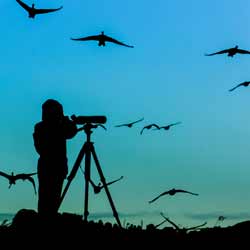Ornithologist Careers
Wikipedia defines birds as feathered, winged, two-legged, warm-blooded, egg-laying vertebrates. There are over 10,000 species of birds found all over the world. What birds fascinate you? Hummingbirds, roadrunners, turkeys, albatross, falcons, eagles, finches, woodpeckers, owls, seagulls, herons, cuckoos, chickens, hawks, sparrows, parrots, warblers, or something else?
Do you enjoy seeing a colorful robin build a nest? Are you enthralled by the freedom of a raven flying effortlessly across the sky? Do you watch documentaries on condors with massive 3-meter wingspans? Are you a fan of penguin colonies? Have you ever fed the ducks at the park? Are you already planning your Big Year? If you’re a bird fanatic, maybe you should become an ornithologist.

Ornithologists are scientists who study birds. The job description can be very broad and far-reaching, but ornithologists do basic and/or applied studies and research on birds. They spend their time in laboratory settings or in natural habitats learning about birds. Basically they are bird experts.
Ornithologists focus on bird’s behavior, anatomy, ecology, ecosystems, conservation, physiology, and psychology. They study their DNA and evolution. They watch how human activity affects birds. Their goals are vast, but ultimately they want to research birds and share their knowledge. They may focus on one type of bird, one location, or one specific research focus.
Ornithologists can focus their research on a variety of things. Maybe they want to discover what blue jays eat, define the predators of pink flamingos, monitor the migration patterns of geese, study why American turkey vultures can track down broken fuel pipes, or see the affects of humans on the kiwi’s environment. Ornithologists must study these things in labs and in the field.
The first step to studying birds is to learn about birds through books and articles. Then ornithologists must travel to see the birds in action. As birds know no boundaries, this means an ornithologist may head to the Alaskan tundra, the remote jungles of the Amazon, or the rolling hills of Arkansas to visit the bird’s natural habitat. Wherever an ornithologist finds themselves and whatever they study, they must take notes, enter data, write papers and grants, observe birds, do field studies, keep records, collect samples, and travel.
Ultimately, an ornithologist’s research allows them to publish articles in scientific journals, teach courses at universities and colleges, or give talks and presentations to bird enthusiasts. By sharing their research and knowledge they can help protect birds and raise awareness.
To become an ornithologist, you need to earn a university degree in biology, wildlife biology, life science, or ecology. Ideally, you will earn a master’s degree with a research thesis too. As with most cool jobs, experience is crucial. To gain experience with birds, join bird watching clubs, go on a Big Year, volunteer with non-profits, attend workshops, seek out jobs at raptor centers, or find internships with government agencies.
Once you have a degree and have built a stand out resume, ornithologists typically can find jobs as teachers, researchers, geneticists, or wildlife biologists. They may work for non-profits, government agencies, universities, environmental consulting firms, wildlife organizations, or private research institutions. Once employed, ornithologists can expect to make about $57,000 per year. This rate may vary depending on employer, experience, and research focus.
Birds are impressive creatures that deserve to be studied. If you love birds and want an outdoor job, then consider becoming an ornithologist. Are you ready to get paid to be a bird expert?
Quick Facts About Ornithologist Careers
Job Title: Ornithologists
Office: Laboratory and Field
Description: Study and research birds
Certifications/Education: University degree, Experience
Necessary Skills: Knowledge of birds
Potential Employers: Non-Profits, Research Institutions, Government Agencies, Wildlife Organizations, Universities
Pay: $57,000 per year
Helpful Ornithologist Employment Links:
- Search Ornithologist Jobs on JobMonkey
- Ornithology.com
- BLS: You’re A What? Ornithologist
- American Ornithologists’ Union
- American Birding Association
- Association of Field Ornithologists
- BirdNet
- Ornithological Societies of North America
- National Audubon Society
- North American Rare Bird Alert: Big Year


 Teach English in Asia
Teach English in Asia  Cruise Ship Jobs
Cruise Ship Jobs  Alaska Fishing Industry Jobs
Alaska Fishing Industry Jobs  Sharing Economy / Gig Economy
Sharing Economy / Gig Economy